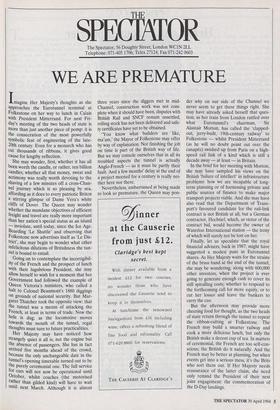SPCC THE
The Spectator, 56 Doughty Street, London WC1N 2LL Telephone: 071-405 1706; Telex 27124; Fax 071-242 0603
WE ARE PREMATURE
Imagine Her Majesty's thoughts as she approaches the Eurotunnel terminal at Folkestone on her way to lunch in Calais With President Mitterrand. For next Fri- day's meeting of the two heads of state is more than just another piece of pomp: it is the consecration of the most powerfully symbolic feat of engineering of the late- 20th century. Even for a monarch who has cut thousands of ribbons, it gives good cause for lengthy reflection.
She may wonder, first, whether it has all been worth the candle, or rather, ten billion candles; whether all that money, sweat and acrimony was really worth devoting to the Shaving of a few minutes off a cross-Chan- nel journey which is so pleasing by sea, affording as it does to every patriotic Briton a _stirring glimpse of Dame Vera's white cliffs of Dover. The Queen may wonder Whether the mundane objectives of efficient freight and travel are really more important than her nation's special status as an island — inviolate, until today, since the Ice Age. Boarding `Le Shuttle' and observing that Folkestone now advertises itself as `Le Dis- trict', she may begin to wonder what other infelicitous dilutions of Britishness the tun- nel is bound to entail.
. Going on to contemplate the incorrigibil- ity of the French and the prospect of lunch With their lugubrious President, she may allow herself to wish for a moment that her Government had followed the example of Queen Victoria's ministers, who called a halt to Colonel Beaumont's 1880 diggings on grounds of national security. But Mar- garet Thatcher took the opposite view: that the tunnel was a means of attacking the French, at least in terms of trade. Now the hole is dug; as the locomotive moves towards the mouth of the tunnel, regal thoughts must turn to future practicalities.
Her Majesty may have noticed how strangely quiet it all is; not the engine but the absence of passengers. She has in fact arrived five months ahead of the crowd, because the only unchangeable date in the tunnel's opening timetable turned out to be the purely ceremonial one. The full service for cars will not now be operational until October, whilst coaches (the motorised rather than gilded kind) will have to wait until next March. Although it is almost three years since the diggers met in mid- Channel, construction work was not com- plete when it should have been, disputes with British Rail and SNCF remain unsettled, rolling stock has not been delivered and safe- ty certificates have yet to be obtained. 'You know what builders are like, ma'am,' the Mayor of Folkestone may offer by way of explanation. Not finishing the job on time is part of the British way of life. But we may console ourselves that in all its troubled aspects the tunnel is actually Anglo-French — so it must be partly their fault. And a few months' delay at the end of a project mooted for a century is really nei- ther here nor there.
Nevertheless, embarrassed at being made to look so premature, the Queen may pon- der why on our side of the Channel we never seem to get these things right. She may have already asked herself that ques- tion, as her train from London rattled over what Eurotunnel's chairman, Sir Alastair Morton, has called the 'clapped- out, jerry-built, 19th-century railway' to Folkestone — whilst President Mitterrand (as he will no doubt point out over the canapes) swished up from Paris on a high- speed rail link of a kind which is still a decade away — at least — in Britain.
In the brief for her meeting with Morton, she may have sampled his views on the British 'failure of intellect' in infrastructure problems: how we are incapable of long- term planning or of harnessing private and public sources of finance to make major transport projects viable. And she may have also read that the Department of Trans- port's favoured candidate for the rail-link contract is not British at all, but a German contractor, Hochtief, which, as victor of the contract bid, would become the owner of Waterloo International station — the irony of which will surely not be lost on her.
Finally, let us speculate that the royal financial advisers, back in 1987, might have suggested a modest punt in Eurotunnel shares. As Her Majesty waits for the strains of the brass band at the end of the tunnel, she may be wondering, along with 600,000 other investors, when the project is ever going to generate enough cash to cover its still spiralling costs; whether to respond to the forthcoming call for more equity, or to cut her losses and leave the bankers to carry the can.
But the afternoon may provide more cheering food for thought, as the two heads of state return through the tunnel to repeat the ribbon-cutting at Folkestone. The French may build a smarter railway and cook a more delicious lunch, but only the British make a decent cup of tea. In matters of ceremonial, the French are too self-con- scious; the British do it naturally. And the French may be better at planning, but when events get into a serious mess, it's the Brits who sort them out. If Her Majesty needs reassurance of the latter claim, she need only remind the President of their next joint engagement: the commemoration of the D-Day landings.


























































 Previous page
Previous page